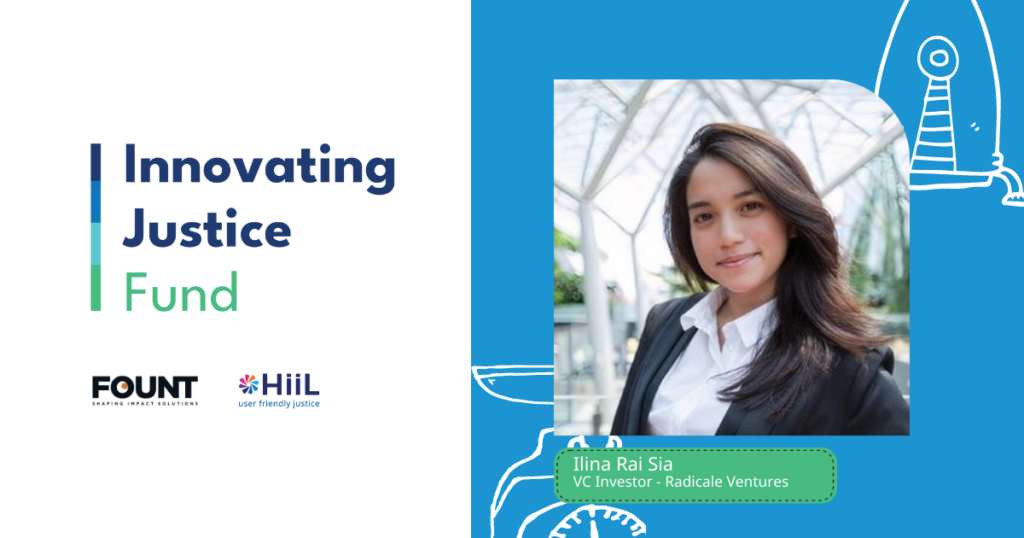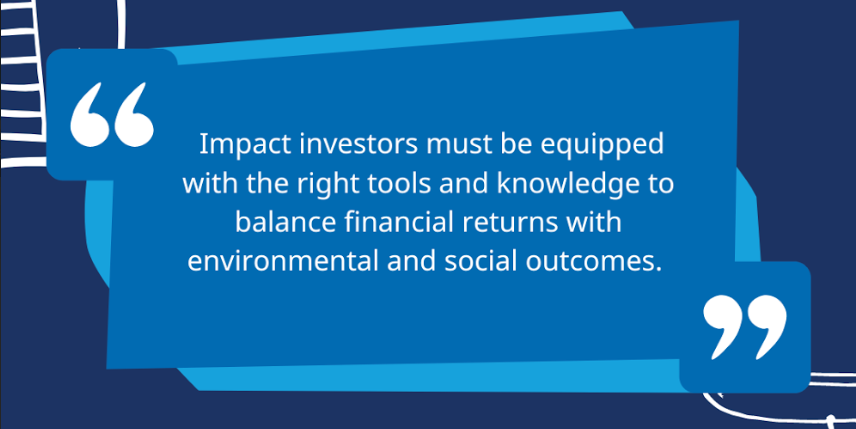Series of articles with investors: impact investment, will it change the world?
Welcome to another interview where we delve into the potential for transformative impacts on people’s lives. Could Impact Investment be one of those game-changers?
Recently, in collaboration with HiiL, we launched the Innovating Justice Fund to invest in highly scalable and groundbreaking solutions, known as Justice-Tech startups. We firmly believe that by amplifying the reach of these startups, we draw closer to reshaping justice into people-centred justice. This endeavour brings us back to the fundamental question: can impact investment change the world?
HiiL’s mission revolves around instigating a profound shift in the way justice is both understood and experienced. In numerous countries, trust in governmental and judicial systems remains limited. Through HiiL’s people-centred approach, individuals and businesses alike can truly feel acknowledged and valued. This process facilitates the reconstruction of trust—an achievement that holds the power to revolutionize the lives of countless individuals. Our aspiration is to reach a turning-point where investments in justice startups creates the enabling environment for people-centred justice. That is justice that’s affordable, accessible, and easy to understand.
Without further ado, read about the insights from Ilina Rai Sia—an Angel Investor and Venture Capitalist deeply committed to sustainability and creating meaningful impacts.

What is Impact Investing from your point of view?
Impact investment is the alignment of financial resources with our values and vision for a better world. It offers a paradigm where economic growth and societal good are not mutually exclusive but coexist.
Personally, as a venture capitalist focusing on deep tech to safeguard planetary health, I see impact investment as an opportunity to support innovative solutions that address critical issues like climate change, biodiversity loss, and ecosystem degradation. It’s about investing in the future of our planet and its inhabitants.
Will it change the world?
Impact investing has, in my view, already changed the world.
Consider the alternative protein sector: companies like Beyond Meat and Impossible Foods, supported by millions from impact-focused funds, have refined and globally distributed their plant-based meat substitutes. This was a niche market just a decade ago, yet their innovative and sustainable approach has stimulated a food industry revolution.
Today, plant-based proteins are commonplace, found in grocery stores and fast-food chains worldwide. This mainstream acceptance underscores changing consumer preferences and the rise of conscious consumption. The ripple effect from these companies’ success has inspired a new wave of startups, significantly contributing to the projected growth of the global plant-based meat market to $35.4 billion by 2027.
These developments signify an important transition towards more sustainable food systems, combating the high greenhouse gas emissions, water, and land usage associated with traditional livestock farming. Impact investing’s influence on the world isn’t speculation—it’s observable fact. The alternative protein sector’s transformation stands as testament to impact investing’s power to disrupt industries and propel us towards a more sustainable future.
While Impact investment has the power to change the world,there are some key issues we need to overcome to ensure we can effectively prioritise social and environmental outcomes.
One of the key challenges in impact investing is the difficulty in quantifying ‘impact’. As someone who focuses on planetary health, this difficulty is especially pronounced when it involves intricate concepts such as biodiversity. While we’ve made progress in comprehending ecosystems and biodiversity, we still have a long way to go in accurately quantifying and monetizing these benefits. How do you assign values to saving an endangered species? What about how cutting down a tree affects the filtration of groundwater, or keeping the soil intact?
It is this complexity that has given rise to carbon ‘tunnel-vision’, where investors pile on to solutions that reduce, capture or utilise carbon simply because it’s something we can account for with a higher degree of accuracy. And while solutions addressing carbon emissions are certainly important, this is unrepresentative of the plethora of issues we are facing on our planet.
Additionally, impact investing sometimes exhibits a skewed distribution of capital, often favouring sectors with greater commercial appeal rather than those that might yield more substantial environmental benefits. For example, in 2021 alone, venture-backed electric vehicle startups raised upwards of $20 billion, and micro mobility players raised close to $3 billion. Despite their positive environmental contributions, they pale in comparison to areas like reforestation/ restoration. Such sectors hold significant potential for environmental restoration and climate change mitigation, but often fail to attract comparable investment (around ~$0.2B) due to their perceived lack of financial viability.
Furthermore, there is an issue that frequently arises when investors, such as venture capitalists, wield considerable influence over the businesses they fund. This can be especially problematic when these investors, despite their best intentions, lack the necessary understanding and training in impact investment strategies. Without a robust understanding of how to balance financial returns with environmental and social outcomes, there is a risk of ‘mission drift’, a phenomenon where businesses deviate from their initial social or environmental objectives in pursuit of financial returns.
So, what needs to be implemented for impact investment to succeed in the mission of changing the world?
Firstly, we must improve current methods for measuring and valuing environmental impact, and expand outside of just carbon. The challenge lies in accurately quantifying the direct and indirect benefits of ecosystem services, biodiversity, and cultural value. One possible approach is adopting and refining mechanisms such as the ecosystem services method, even though it has its limitations. By incorporating such methods into their decision-making processes, impact investors can adopt a more holistic understanding of the potential impacts of their investments. It is only through continuous experimentation, learning, and refinement that we can create robust methodologies comparable to carbon accounting in other environmental fields.
There is also a need for improvements in investor education. Impact investors must be equipped with the right tools and knowledge to balance financial returns with environmental and social outcomes. This includes providing educational pathways for investors to understand the nuances of impact investment strategies and creating robust feedback networks that facilitate the exchange of knowledge and best practices. When investors play an active role in guiding businesses, they must be well-equipped to prevent mission drift and ensure that the venture stays true to its impact objectives.
If we can effectively shift how we approach impact investing, impact investing, in my opinion, will be the most influential tool in helping us build a sustainable and equitable world.

The challenges are clear: Investor education, improved impact measurement and attracting investment for impact startups. By overcoming these challenges, we can revolutionise the role impact investment plays in people-centred justice. Our goal is to set the trend, a turning point to make justice accessible, affordable, and easy to understand. This is why we launched the Innovating Justice Fund, a dedicated platform for investing in and amplifying the growth of Justice-tech startups. We extend an invitation to collaborate with you in tackling these challenges, fostering a more sustainable and inclusive impact investing environment within emerging economies. Let’s make a difference together.
About Ilina Rai Sia

Ilina Rai Sia is an angel investor and venture capitalist. She transitioned from management consulting to pursue her passion for impact investing – first at UN-Habitat and then at venture capital funds focusing on sustainability and impact. She has dedicated over 3000 hours to studying climate themes, including alternative proteins, renewable energy, green buildings and ecosystem management. She currently angel invests and consults for pre-seed startups developing deep technologies to address planetary health.